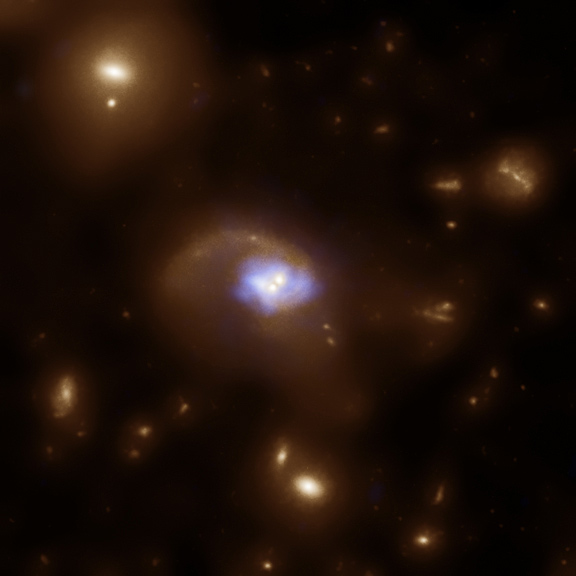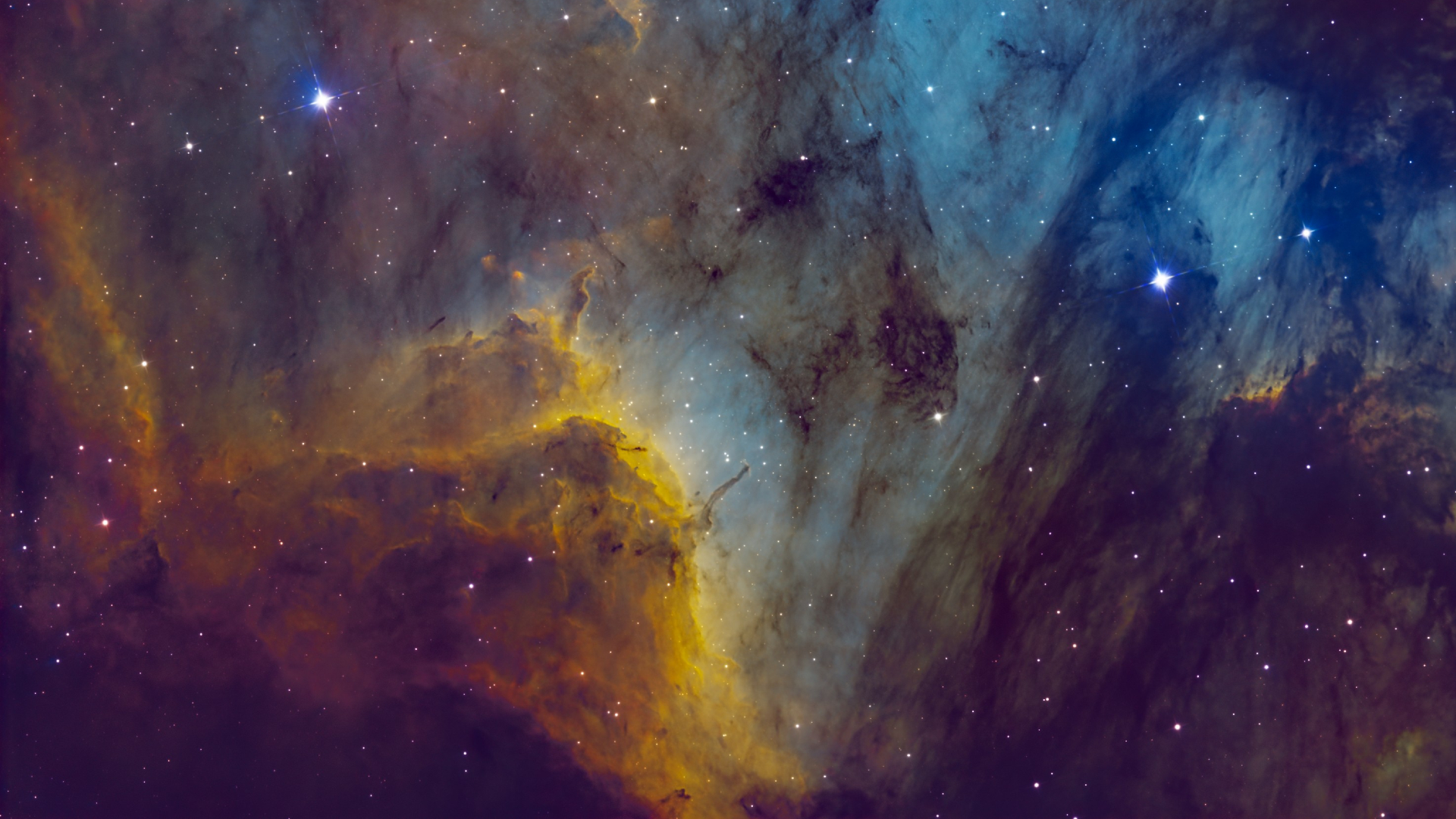Black Hole Recoils From Mysterious Cosmic Slingshot

Ablack hole has been spotted recoiling from a mysterious slingshot effect,possibly from encounters with several other black holes, a new study has found.
Theexact cause of the black hole's kickback is still unknown, but scientists havecome up with two possible theories to explain its odd cosmic behavior.
Onetheory suggests the slingshot effect was produced by interactions within atriple black hole system. The other attributes the recoiling action to gravitationalwaves produced by two supermassive black holes as they merged together a few million years earlier.
Boththeories hinge on two objects near the black hole that were observed in thevisible range of the light spectrum. But these optical sources representdifferent things in each theory.
Astronomersdiscovered the recoiling black hole, called CID-42, while conducting a large,multi-wavelength survey, called the Cosmic Evolution Survey (COSMOS). ?It sitsin a galaxy about 3.9 million light-years away, which astronomers were able toobserve by combining observations from different space observatories andtelescopes. [Photo of the recoiling black hole.]
Inthe black hole image, the X-ray source detected by Chandra is colored blue,while the Hubble observations are shown in gold. While the two optical sourcesare both visible in the Hubble data, they are too close for Chandra to resolveseparately.
TheCOSMOS survey? combines observations from NASA's Chandra X-ray Observatory, theHubble Space Telescope, the European XMM-Newton, as well as ground-basedobservatories. To date, it has identified about 2,600 X-ray sources in deepspace, but only one ? the CID-42 black hole ? corresponds with two opticalsources.
Breaking space news, the latest updates on rocket launches, skywatching events and more!
A"tail" of merging galaxies
Onebig clue for astronomers studying the CID-42 black hole is the long tail trailingits host galaxy.
"Thegalaxy's long tail suggests that a merger between galaxies has occurredrelatively recently, only a few million years earlier," Cassini officialssaid in a statement.
Inaddition, observations from the Very Large Telescope and the Magellan telescopesuggest that the difference in speed of the two optical sources is at least 3 millionmph.
Astronomersalso studied X-ray observations from Chandra and XMM-Newton to gather furtherinformation about CID-42. Absorption from iron-rich gas indicates that the gasis moving rapidly away.
Thiscould be gas in the galaxy between our Milky Way galaxy and one of the blackholes that is falling into another black hole, or it could be gas on the farside of the black hole that is blowing away, researchers said in a statement.
"Takentogether, these pieces of information allow for two different scenarios forwhat is happening in this system and the nature of the two optical sources inthe center of the image," Cassini officials said.
AstronomersFrancesca Civano and Martin Elvis of the Harvard-Smithsonian Center forAstrophysics detailed their research on CID-42 in the July 1 edition of TheAstrophysical Journal.
Cosmicbullying?
Inthe first scenario, researchers think that a triple black hole encounter couldhave been produced through a two-step process.
First,a collision between two galaxies created a galaxy with a pair of black holes in aclose orbit. But, before these black holes could merge, yet another galaxycollision occurred and a third supermassive black hole spiraled toward theexisting pair.
Theinteraction between the three black holes in such a system could result in thelightest one being ejected ? the recoiling black hole.
Forthis theory, the two optical sources spotted by the COSMOS survey would beactive galactic nuclei, with one thriving off material pulled along by - andfalling onto ? the recoiling supermassive black hole. The second source wouldthen be the result of the two other black holes merging into a single object.
Asan added caveat theory, the fast absorption of X-ray emissions seen aroundCID-42 would be high-speed interstellar winds blowing between the activegalactic nuclei.
Whatabout gravity waves?
Thescenario that could explain the recoiling black hole's appearance aregravitational waves, though it would require a huge cosmic collision to setthem off, researchers said.
Accordingto this theory, a merger between two supermassive black holes at the center ofthe galaxy would emit gravitational waves from the collision process. Thesewaves, then, could cause the resulting black hole to be flung from the center of the galaxy.
Inthis case, the ejected black hole is the point source in the lower left, and acluster of stars that are left behind in the center of the galaxy is in theupper right. The X-ray absorption that the researchers observed would be causedby gas that is falling onto the recoiling black hole.
Thisscenario was recently proposed by Peter Jonker from the Netherlands Institutefor Space Research in Utecht as a possible explanation for a different sourcein a separate galaxy.
Jonkerand his team of researchers discovered a Chandra X-ray source about ten thousandlight-years (in projection) away from the center of a galaxy. The studypresents three possible explanations for this object: it is an unusual type ofsupernova, it is an ultraluminous X-ray source with a very bright opticalcounterpart, or it is a recoiling supermassive black hole that resulted from agravitational wave kick.
Furtherobservations will likely help to eliminate or support one of the scenarios forCID-42, researchers said.
- Hubble Photos: When Galaxies Collide
- The Strangest Things in Space
- Video - Black Holes: Warping Time & Space

Denise Chow is a former Space.com staff writer who then worked as assistant managing editor at Live Science before moving to NBC News as a science reporter, where she focuses on general science and climate change. She spent two years with Space.com, writing about rocket launches and covering NASA's final three space shuttle missions, before joining the Live Science team in 2013. A Canadian transplant, Denise has a bachelor's degree from the University of Toronto, and a master's degree in journalism from New York University. At NBC News, Denise covers general science and climate change.
